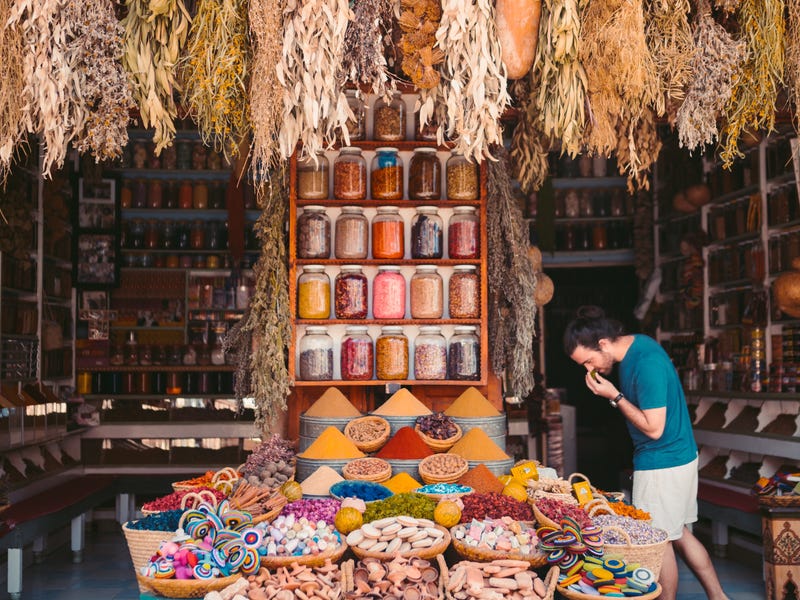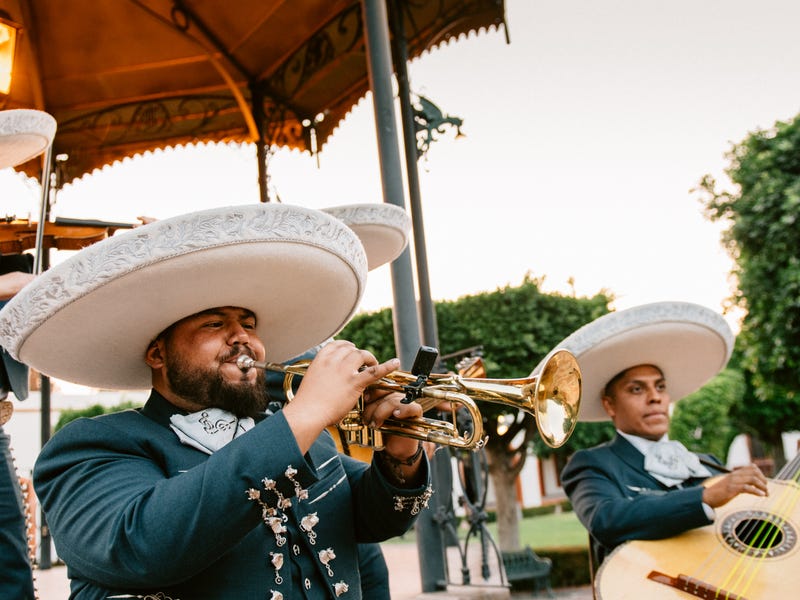Let’s face it, one of the most common questions you’ll have to answer in Spanish as a second language speaker is: Where are you from?
Whether you’re still a beginner at Spanish or are just working on improving your accent, Spanish speakers will likely pick up that you’re not a native speaker. One of the most natural reactions will be to ask where you’re from to get to know you a bit better.
When this happens as you meet people (which it inevitably will!), you should be prepared to respond with flair and precision. That’s why we’ll teach you not only how to say “where are you from?” in Spanish, but also how to respond when someone asks you the very same question!
Similarly, knowing how to ask people where they’re from will allow you to connect with locals on a deeper level. If you visit big Latin American cities like Lima or Bogotá, you’ll find that many of the locals aren’t actually from there.
Many people in Latin America migrate from small towns to urban centers, so being able to ask them about where they’re from and where they were born in Spanish will help you make more genuine connections with the people you meet in your travels!
Finally, you’ll need to know about countries, cities, and nationalities in Spanish to talk about places of origin in Spanish! So make sure to check it out.
So, are you ready to learn how to ask questions about place of origin in Spanish? ¡Vámonos!
Download your free Spanish language essentials eBook here to get a head start on Spanish basics.
How do I say Where are you from in Spanish
Asking someone where they’re from is one of the most natural questions to ask someone you’re trying to get to know, just like asking “how are you?”. So, whether you’re trying to make friends with your new classmates or work colleagues, or are going on a romantic date, asking someone where are you from in Spanish will help you get to know the person in front of you on a closer level.

| English | Spanish | IPA | Pronunciation |
| Where are you from? | ¿De dónde eres? | de ˈðõnde ˈɛɾes ‖ | deh don-deh eh-res |
| Where are you from? (plural) | ¿De dónde son? | de ˈðõnde ˈsõn ‖ | deh don-deh sohn |
| Where are you from? (formal) | ¿De dónde es? | de ˈðõnde ˈɛs ‖ | deh don-deh ehs |
| Where do you come from? | ¿De dónde vienes? | de ˈðõnde ˈβjenes ‖ | deh don-deh vee-eh-nes |
| Are you from here? | ¿Eres de aquí? | ˈɛɾes̬ ðe aˈki ‖ | eh-res deh ah-key |
| Are you from here? (formal) | ¿Usted es de aquí? | usˈtɛð ˈɛs̬ ðe aˈki ‖ | oos-ted ehs deh ah-key |
| Are you from here? (plural) | ¿Ustedes son de aquí? | usˈteðes ˈsõn de aˈki ‖ | oos-teh-des sohn deh ah-key |
| Which city are you from? | ¿De qué ciudad eres? | de ˈke sjuˈðað ˈɛɾes ‖ | deh keh see-ooh-dad eh-res |
| Are you also from here? | ¿También eres de aquí? | tãmˈbjɛn ˈɛɾes̬ ðe aˈki ‖ | tam-bey-ehn eh-res deh ah-key |
| Are you from around here? | ¿Eres de por aquí? | ˈɛɾes̬ ðe poɾ aˈki ‖ | eh-res deh pore ah-key |
| Where did you grow up? | ¿Dónde creciste? | ˈdõnde kɾeˈsiste ‖ | don-deh creh-sees-teh |
| Where were you raised? | ¿Dónde te criaste? | ˈdõnde te ˈkɾjaste ‖ | don-deh teh cree-as-teh |
| Where were you born? | ¿Dónde naciste? | ˈdõnde naˈsiste ‖ | don-deh nah-sees-teh |
| Which part of the world did you grow up in? | ¿En qué parte del mundo creciste? | ɛ̃n ˈke ˈpaɾte ðɛl ˈmũndo kɾeˈsiste ‖ | ehn keh par-teh del moon-doe creh-sees-teh |
| What’s your nationality? | ¿Cuál es tu nacionalidad? | ˈkwal ˈɛs tu nasjonaliˈðað ‖ | coo-al ehs too nah-see-oh-na-lee-dad |
| What country do you come from? | ¿De qué país vienes? | de ˈke paˈis̬ ˈβjenes ‖ | deh keh pa-ees vee-eh-nes |
| Where do you live? | ¿Dónde vives? | ˈdõnde ˈβiβes ‖ | don-deh vee-ves |
| Are you coming from far away? | ¿Vienes de muy lejos? | ˈbjenes̬ ðe mwi ˈlexos ‖ | vee-eh-nes deh mooy leh-hos |
| May I ask where you’re from? | ¿Puedo saber de dónde eres? | ˈpweðo saˈβɛɾ ðe ˈðõnde ˈɛɾes ‖ | poo-eh-doh sah-ber deh don-deh eh-res |
| I would like to know where you’re from. | Me gustaría saber de dónde eres. | me ɣustaˈɾia saˈβɛɾ ðe ˈðõnde ˈɛɾes ‖ | meh goose-ta-ree-ah sah-ber deh don-deh eh-res |
| Where is your family from? | ¿De dónde es tu familia? | de ˈðõnde ˈɛs tu faˈmilja ‖ | deh don-deh ehs too fa-me-lee-ah |
| Does your family live here also? | ¿Tu familia también vive aquí? | tu faˈmilja tãmˈbjɛ̃m ˈbiβe aˈki ‖ | too fa-me-le-ah tam-bee-ehn vee-veh ah-key |
How to respond to where are you from
Below, you’ll find over a dozen ways to answer when someone asks you where you’re from. Most of them have a specific country or city, so just swap it out for the one that matches where you’re from!

| English | Spanish | IPA | Pronunciation |
| I’m from Venezuela. | Soy de Venezuela. | ˈsoi̯ ðe βeneˈswela ‖ | soy deh veh-neh-zoo-eh-la |
| I’m from Buenos Aires | Soy de Buenos Aires. | ˈsoi̯ ðe ˈβwenos ˈai̯ɾes ‖ | soy deh boo-eh-nos ah-e-res |
| We’re from California. | Somos de California. | ˈsomos̬ ðe kaliˈfoɾnja ‖ | so-mos deh ka-lee-fore-nee-ah |
| I’m Mexican, but I was born and raised in the United States. | Soy mexicano, pero crecí en los Estados Unidos. | ˈsoi̯ mexiˈkano | ˈpɛɾo kɾeˈsi ɛ̃n los ɛsˈtaðos uˈniðos ‖ | soy meh-he-ca-no, peh-ro nah-see ehn los es-ta-dos oo-nee-dos |
| I’m Argentinian and live in Peru. | Soy argentina y vivo en Perú. | ˈsoj aɾxɛ̃nˈtina i̯ ˈβiβo ɛ̃m pɛˈɾu ‖ | soy ar-hen-tee-na e vee-vo ehn peh-roo |
| I was born in Miami but my parents are Peruvian. | Nací en Miami pero mis papás son peruanos. | naˈsi ɛ̃m ˈmjami ˈpɛɾo mis paˈpas ˈsõm pɛˈɾwanos ‖ | na-see ehn miami peh-ro mees pa-pahs sohn peh-roo-ah-nos |
| My family is from Chile but I was born and raised in Mexico City. | Mi familia es de Chile pero yo nací y crecí en la Ciudad de México. | mi faˈmilja ˈɛs̬ ðe ˈʧile ˈpɛɾo ˈʝo naˈsi i kɾeˈsi ɛ̃n la sjuˈðað ðe ˈmexiko ‖ | me fa-mee-lee-ah ehs deh chee-le peh-ro yo nah-see e creh-see ehn la see-oo-dad deh meh-he-co |
| I live near here, close to downtown. | Vivo aquí cerquita, por el centro. | ˈbiβo aˈki sɛɾˈkita | poɾ ɛl ˈsɛ̃ntɾo ‖ | vee-vo ah-key ser-key-ta, pore el sehn-tro |
| I live very far away, in the outskirts of town. | Vivo muy lejos, en las afueras de la ciudad. | ˈbiβo mwi ˈlexos | ɛ̃n las aˈfwɛɾas̬ ðe la sjuˈðað ‖ | vee-vo mooy leh-hos, ehn las ah-foo-eh-ras deh la see-ooh-dad |
| I was born here and I’ve lived here my whole life. | Aquí nací y aquí he vivido toda mi vida. | aˈki naˈsi j aˈki ˈe βiˈβiðo ˈtoða mi ˈβiða ‖ | ah-key na-see e ah-key eh vee-vee-do to-da me vee-da |
| I come from Colombia, I’m in Lima on vacation. | Vengo de Colombia, estoy en Lima de vacaciones. | ˈbɛ̃nɡo ðe koˈlõmbja | ɛsˈtoj ɛ̃n ˈlima ðe βakaˈsjones ‖ | vehn-go deh co-lom-bee-ah, ehs-toy ehn lee-ma deh va-ca-see-oh-nes |
| I’m American but my partner is Guatemalan. | Soy estadounidense pero mi pareja es guatemalteca. | ˈsoj ɛstaðou̯niˈðɛ̃nse ˈpɛɾo mi paˈɾexa ˈɛs̬ ɣwatemalˈteka ‖ | soy estda-do-oo-nee-dehn-seh peh-ro me pa-reh-hah ehs goo-ah-teh-mal-teh-ca |
| I was born in Central America, but I now live in South America. | Crecí en Centroamérica, pero ahora vivo en Sudamérica. | kɾeˈsi ɛ̃n sɛ̃ntɾoaˈmɛɾika | ˈpɛɾo aˈoɾa ˈβiβo ɛ̃n suðaˈmɛɾika ‖ | creh-see ehn sehn-tro-ah-meh-ree-ca, pehr-oh ah-oh-ra vee-vo ehn sood-ah-meh-ree-ca |
| I’m Chilean, he is Argentinian, and they are Colombian. | Yo soy chilena, él es argentino, y ellas dos son colombianas. | ˈɟʝo ˈsoi̯ ʧiˈlena | ˈɛl ˈɛs aɾxɛ̃nˈtino | j ˈeʝas̬ ˈðos ˈsõn kolõmˈbjanas ‖ | yo soy che-leh-na, ehl es ar-hen-tee-no e eh-yas dos son co-lom-bee-ah-nas |
| I’m from Philadelphia, in the United States. | Soy de Filadelfia, en los Estados Unidos. | ˈsoi̯ ðe filaˈðɛlfja | ɛ̃n los ɛsˈtaðos uˈniðos ‖ | soy deh fee-la-del-fee-ah, ehn los ehs-ta-dos ooh-nee-dos |
| I’m from a city in the United States called Austin. | Soy de una ciudad en los Estados Unidos que se llama Austin. | ˈsoi̯ ðe ˈuna sjuˈðað ɛ̃n los ɛsˈtaðos uˈniðos ˈke se ˈʝama ˈau̯stĩn ‖ | soy deh oo-na see-ooh-dad ehn los ehs-ta-dos ooh-nee-dos keh seh yah-ma ah-oohs-teen |
| I’m from California, from a city near Los Ángeles. | Soy de California, de una ciudad cerca de Los Ángeles. | ˈsoi̯ ðe kaliˈfoɾnja | de ˈuna sjuˈðað ˈsɛɾka ðe los ˈãnxeles ‖ | soy deh ka-lee-fore-nee-ah, deh ooh-na see-ooh-dad ser-ca deh los ahn-heh-les |
| I’m from the mountains. | Soy de la sierra. | ˈsoi̯ ðe la ˈsjɛra ‖ | soy deh la see-eh-ra |
| I’m from the coast. | Soy de la costa. | ˈsoi̯ ðe la ˈkosta ‖ | soy deh la cos-ta |
| I’m from the city. | Soy de la ciudad. | ˈsoi̯ ðe la sjuˈðað ‖ | soy deh la see-ooh-dad |
| I’m from the countryside. | Soy del campo. | ˈsoi̯ ðɛl ˈkãmpo ‖ | soy del cam-po |
Hispanic Hospitality
If you’ve been lucky enough to travel to a Spanish speaking country, you may have noticed how warm and friendly people tend to be. Most visitors are shocked to find out how kind and welcoming Spanish speakers are, even to foreigners who may not even speak the language.
This is part of the reason why the top two countries with the most international tourists in 2021 were Mexico and Spain. People who visit often feel like home, which is why an immersive Spanish learning experience could be a fantastic idea for your language-learning journey. What better way to learn Spanish than by visiting Spain or Latin America and making long-lasting connections with new friends?
What does “Mi casa es su casa” mean?
Hispanic cultures are so hospitable, in fact, that this phrase is famous all over the world. “Mi casa es su casa,” which is also often shortened to “Mi casa, su casa,” literally means “my house is your house.” It is an expression used to imply that I’m happy to share my house with you, similar to “make yourself at home.”
If you hear this from a Spanish speaker, you should definitely not take it literally, though! Definitely take it as a sign of warmth and kindness, and do make sure to feel comfortable as a guest, but remember to always be polite and thoughtful!

Download our free Spanish essentials eBook
Bond with the locals no matter where you go
Knowing how to ask someone where they’re from will help you make deeper connections with people, no matter where in the world you are. Perhaps more importantly, you will be able to answer this question with confidence, as you will undoubtedly have to numerous times as you meet people when you visit any of the 21 countries that speak Spanish.
If you think this article will help you make new friends and maintain friendships in Spanish, you should check out our Spanish blog. We publish many useful guides that will help you take your Spanish conversations to the next level, including guides on clothing items in Spanish, drinks in Spanish, and much more!
Oh, and don’t forget to bookmark our page, as we publish new (and free!) guides every month! Now you’ll definitely never run out of things to talk about with your Spanish speaking friends.




